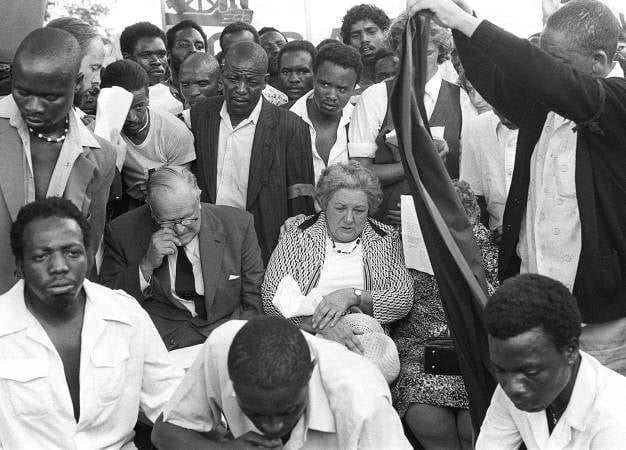
The contrast between the hope to which the struggle against a system that rightly was classified as a crime against humanity engendered and the tawdry society of the present which holds almost no hope for millions is the tragedy of contemporary South Africa, writes Serjeant at the Bar
Thirty eight years ago, Dr Neil Aggett died in detention. That he was murdered by members of the Security Police was, in all likelihood, the cause of his tragic demise.
Finally an inquest is being conducted which will provide the country with the truth.
The hearing of evidence from survivors of the brutal regime of incarceration without trial and all manner of torture, as did the inquest into the murder of Ahmed Timol, has informed the country what was done in the name of the Apartheid regime.
It is significant that these inquests have delivered more truth than emerged from the Truth and Reconciliation Commission.
The Aggett inquest shines a torch on a system that was run by criminals purporting to be police officers, instituted by politicians, none of whom were ever held accountable and permitted by a judiciary, a few brave exceptions aside, which refused to hold the police to legal constraints.
None of these judges were called by the TRC to explain their conduct.
This conduct included admitting evidence procured from witnesses who had been detained for lengthy periods and tortured.
Judges embraced the "total onslaught against the state" discourse propagated by the regime and jettisoned fidelity to any legal principle that might have tempered the system.
Not even a sorry from any of these apartheid apologists who wore the robes of judges, even when the few of their colleagues showed them the legal way by holding to principle in compelling minority judgments!
The implications of the present proceedings extend to our present condition.
Professor Firoz Cachalia captured much of this when, after his testimony before the Aggett inquest, he said: "I have never spoken about my experience in detention at that time to anyone, not family, friends and comrades and I didn't expect the emotion I felt today on the stand.?
"I think coming here today to speak about Neil's death is important for historical memory and record and for interaction across generations. It reminds us all what the struggle was about."?
In a way, it was a pure ethos. We were bound together to fight for a cause. But not that we’ve achieved this cause we see that moral clarity has dipped.
"Talking about Neil today helps rekindle the memory of something that is pure and good and it’s what we need right now to keep our society on track."
The testimony of both Prof Cachalia and Ismail Momoniat helps sustain the collective memory.
This should extend beyond the gross inhumanity of the security police to the bravery and commitment of those detained and to the tragic loss of Timol, Aggett, Steve Biko, Jacob Mashabane and some 70 others.
The struggle for which they died or suffered was designed to produce an egalitarian democratic country.
While, as Momoniat testified, the racism of the system meant that black detainees were treated with even greater brutality, the constituency of detainees should give us pause.
The fight was waged by many who now find themselves at the receiving end of populist treatment.
Momoniat, for example, was singled out by the EFF in his role as deputy director general in Treasury because he is of Indian descent.
That he was tortured and suffered egregiously for his political commitment seems of no moment.
We are truly a very distant way from a society based on what Martin Luther King envisaged when he said that a person's character rather than colour is determinative of moral assessment.
Prof Cachalia referred to a past when something was "pure and good".
By this he surely meant a dedication to the construction of a society which would be the very antithesis of the apartheid regime.
It was pure in that people were prepared to suffer and, if necessary, die for a noble cause.
There were no monetary rewards for their decisions, no personal aggrandisement for risks taken and no lucrative contracts to be gained.
Thirty eight years later, that pure and noble past has been replaced by nepotism, corruption, accumulation by a few and the almost criminal disregard for millions who are manifestly entitled to a dignified life.
The contrast between the hope to which the struggle against a system that rightly was classified as a crime against humanity engendered and the tawdry society of the present which holds almost no hope for millions is the tragedy of contemporary South Africa.
How, it may be asked, did we come to this pass?
Why were activists able to summon the sustained courage to defeat a ghastly regime yet today there seems to be so little of the same ingredient in stock to take the difficult decisions to ensure that the country is rebooted to implement the objectives of the Constitution which were imbued with the same purity and hope of which Prof Cachalia spoke.
When President Ramaphosa delivers his State of the Nation Address on February 13, would it be too much to demand that, as a key player in the resistance to the apartheid regime and the formulation of the Constitution that he set out concrete steps to be taken this year to rekindle that hope?
Were he to lay out decisions that will be implemented within a tight timetable to ensure delivery of services to those most in need, and to ensure punishment and not reward for the rent capture by politically connected elites, that would be a start.
If not, then one may well conclude that Neil Aggett, Steve Biko, and the others who died in detention, simply lost their lives in vain.
- Serjeant at the Bar is a senior legal practitioner with a special interest in constitutional law.
** Want to respond to the columnist? Send your letter or article to voices@news24.com with your name, profile picture, contact details and location. We encourage a diversity of voices and views in our readers' submissions and reserve the right not to publish any and all submissions received.
Disclaimer: News24 encourages freedom of speech and the expression of diverse views. The views of columnists published on News24 are therefore their own and do not necessarily represent the views of News24.



 Publications
Publications
 Partners
Partners























